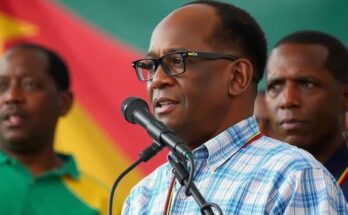In a narrow runoff election, leftist candidate Yamandú Orsi has triumphed over conservative Álvaro Delgado, signaling a shift in Uruguay’s political landscape. Orsi received just over 49% of the votes in a setting of strong voter turnout. His victory reflects growing public discontent with current governance amid economic hardships. Orsi’s campaign emphasized moderate reform and inclusivity, drawing on past successes of the Broad Front coalition’s earlier terms.
In a closely contested runoff election, Yamandú Orsi, the leftist candidate and former history teacher, has secured a significant victory over Álvaro Delgado of the centre-right coalition, marking a shift in Uruguay’s political landscape. The Broad Front coalition, under Orsi’s leadership, received just over 49% of the votes, compared to Delgado’s 46%, amidst a compelling voter turnout of around 90%. Celebrations erupted in the capital, where Orsi expressed his commitment to unity among Uruguay’s diverse population, emphasizing that his administration will welcome differing viewpoints in order to achieve collective national progress.
Delgado acknowledged his defeat gracefully, stating, “With sadness, but without guilt, we can congratulate the winner.” Orsi’s moderate campaign strategy appealed to voters who are increasingly disillusioned with the incumbent parties, particularly due to ongoing economic challenges post-pandemic. His platform promotes a blend of market-friendly policies and enhanced social welfare programs, which parallels the Broad Front’s previous administrations that successfully implemented progressive reforms, including the legalization of abortion and same-sex marriage.
In his victory speech, President-elect Orsi pledged to foster dialogue and collaboration across various sectors of Uruguay’s society. He also proposes targeted reforms aimed at revitalizing agriculture and attracting investment, while being mindful of the expectations set forth by trade relationships, including those within the Mercosur bloc. Orsi’s approach appears to have struck a chord with voters who aspire for improved working conditions and opportunities for future generations, as highlighted by a supporter who expressed optimism regarding the prospective changes.
The significance of Orsi’s victory not only lies in altering the political dynamic within Uruguay but also reflects a broader global trend of anti-incumbency sentiment in various democratic nations. His official term will commence on 1 March 2025, as he prepares to navigate the complexities of leadership in a transforming political environment.
Orsi’s ascendancy indicates a longing for a balance between economic viability and social equity, underscoring Uruguay’s tradition of engaging in progressive reforms while maintaining stability within its political sphere.
Yamandú Orsi’s recent victory in Uruguay comes against the backdrop of a global wave of elections where incumbent parties have faced considerable challenges. The country has seen rising public dissatisfaction linked to economic struggles experienced in the aftermath of the pandemic. Orsi’s return to power as a member of the Broad Front presents an opportunity to revisit successful social reforms from the party’s previous governance. Such reforms contributed to significant societal changes, including enhanced rights and welfare for various demographics in the nation. The political climate in Uruguay is distinctive in its avoidance of extreme populism, in contrast to trends observable in neighboring countries and the United States. With compulsory voting resulting in high turnout rates, the election demonstrated an engaged electorate eager for change amid economic turmoil. As new leadership begins, the nation looks in anticipation towards policies that may better align with the population’s needs and aspirations.
Yamandú Orsi’s recent election as President of Uruguay signifies a pivotal shift towards leftist governance amidst growing public discomfort with incumbent leadership. His victory highlights the electorate’s desire for unity, dialogue, and an equitable approach to socio-economic challenges. Orsi’s commitment to moderate reform within a collaborative framework presents an optimistic outlook for the future of Uruguay, reflective of both public sentiment and historical progress. With a significant voter turnout and engagement, Orsi’s administration begins an essential chapter in the nation’s political history, advocating for a balanced approach that promotes both growth and social welfare.
Original Source: indianexpress.com




